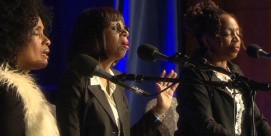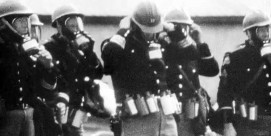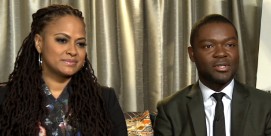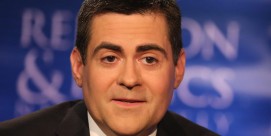In This Episode << SLIDE LEFT TO SEE ADDITIONAL SEGMENTS
Dr. Walter Fluker Extended Interview
Read more of our interview with Walter Fluker, director and editor of the Howard Thurman Papers Project at Morehouse College:
Q: Tell me a little bit about how Howard Thurman influenced you in your own life and your own journey.
A: Actually, Thurman was perhaps the most influential person in my entire personal spiritual journey. But more important was his professional [influence]. He set the tone for where I would be for the next 10 to 15 years after meeting him. I was a student at Garret Theological Seminary in Evanston, Illinois, and there was a convocation held on Howard Thurman. The man himself appeared, and I was the student who picked him up at the airport. In many ways it changed my life, and he saved me for a ministry (I am ordained as well as [being] a professor). I had really entertained going to law school because I was bored with theology and the church. But Thurman was the person who provided for me a fresh start — thinking differently about God, the world, and ways in which you could change society.
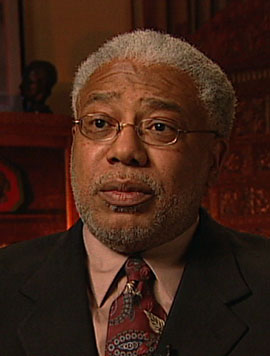 Q: What did he say to you to prompt that change?
Q: What did he say to you to prompt that change?
A: He asked me a question at lunch. He was a very, very intimate and very caring person. And at a very private moment, he asked me what was I going to do with my life. I later discovered this was what he asked everyone. I said, “Well, I’m thinking about seminary. Beyond seminary, I’m thinking about ordained ministry. I’m thinking about maybe getting a Ph.D.” I went on and on and on. And he said, “But what do you really want to do?” And I said, “I’d like to see the church really engaged in society, finding ways in which you change the world.” And he looked at me for a long time very, very intimately (his voice was so soft and reassuring; I hate to romanticize, but it was just so soothing), and he said, “Young man, all social issues are temporary and brief. Go deep.” I hadn’t the slightest idea what he meant. All I knew was that the ground shifted. For me, it was the beginning of a long-time relationship with Howard Thurman and the Thurman family.
Q: Tell me about his influence on Martin Luther King and how he really provided so much of the foundation for what Dr. King was about.
A: The influence of Thurman on King is at several levels. He was a close friend of the King family. He was a Morehouse man. And to be a Morehouse man is maybe the next thing to being close to God — I don’t know. But here at Morehouse, we tend to think that way. (Unfortunately, I’m not a Morehouse man, and I don’t have that access to God.) But Thurman and King were part of a longstanding tradition at Morehouse College, which wed spirituality and social transformation and used that as a platform for the development of public leadership. And these were race men. These were men who were concerned about not only race relations in America but throughout the world. There was a very large international conversation going on. Part of that conversation was the use of nonviolence. Thurman was not the first to talk about nonviolence as a strategy or a philosophy of life for African-Americans, but he was certainly part of a very elite company. James Weldon Johnson and many others had actually been in conversation with Gandhi, at least in correspondence with Gandhi, before 1936, when Thurman and a very small delegation of African-Americans met with the Mahatma, and in that conversation Gandhi made some very interesting statements that some think prophetic. One was that the unadulterated message of nonviolence would probably come to the world through African-Americans. This was in response to Thurman’s and his wife’s question asking whether or not nonviolence might really work in America, and whether Gandhi would be willing to come to America. Gandhi’s response was, of course, that he had to make sure nonviolence would work where he was. But he really felt that this message of nonviolence would probably come to the world through African-Americans, and he wanted the Thurman delegation to sing a spiritual for him – “Were you there when they crucified our Lord?” — because he felt it got to the heart of suffering — suffering becoming, of course, a vehicle for transformation. So, at that level, Thurman is in many ways an architect — at least we call him the spiritual architect of the nonviolent movement in America. At Howard University, where Thurman was teaching when he left to go to India, there was also Benjamin Elijah Mays, former president of Morehouse College for over a quarter of a century. Mordecai Wyatt Johnson was the president at Howard, another Morehouse man. And after Thurman’s return from India in 1936, Benjamin Mays and Mordecai Johnson also visited India later. It was through Mordecai Johnson, according to Martin Luther King, Jr., that he really first heard the message of Gandhi. Some scholars have revealed that that’s not necessarily the case, but King remembered that it was at a speech that Johnson made in Chester, Pennsylvania, when King was a student at Crozier Seminary, where he first head the electrifying message of Gandhi. And King said he left that meeting and purchased every book he could find on Gandhi and nonviolent resistance. Of course, it doesn’t stop there. There’s also [Thurman’s] pastoral relations ship with Martin Luther King, Jr., which really lasted throughout his adult life, certainly his public life. Thurman was always interested in how he might provide a spiritual resource for leaders who were in the thick of the struggle. In 1958, after King was stabbed in Harlem when the woman pushed a letter opener through his chest, Thurman visited him in the Harlem Hospital, and we have correspondence that speaks of that visit. Thurman makes several recommendations to King. Perhaps the most profound is that he asks King to deepen his channels, because he’s become part of a movement that will have its own life and vitality, and [he] suggests to King that little though he may know it, this movement has a life of its own and will become an organism that will swallow him up unless he deepens his own channels. Scholars look at the period in the Harlem Hospital as very important for King, because several months later he was on his way to India. Before the visit to India, King did agree with nonviolence as a tactical maneuver, but it had not become a philosophy of life. After his visit to the “land of Gandhi,” as he called it, he returns and embraces nonviolent resistance as a way of life, not just a strategic maneuver. Thurman, we believe, is at the center of that tradition that offers to King the whole idea of a nonviolent ethic, and perhaps [it is] portrayed best in his book “Jesus and the Disinherited,” which Thurman published in 1949.
Q: Could you talk about the importance of that kind of influence?
A: Tradition is important. Leaders like King do not arise out of a historical vacuum. There are movements, and there are other personalities who actually sow the seeds. Thurman is one of those persons who sow the seeds. In fact, I don’t believe you’d get a Martin Luther King, Jr. without a Howard Thurman. Part of his great legacy is that he was one of those who actually sowed the seeds and may be considered the architect of the spiritual dimension of the nonviolent resistance movement here in America.
Q: In “Jesus and the Disinherited,” in his writings and sermons, what are some of those principles that were then transferred to the activism of King and others?
A: For Thurman, the critical question about Jesus was not his divinity. This sets Thurman apart from many in orthodox Christianity. It’s what must the message of Jesus say? Or what can it say to those whose backs are against the wall? This is [Thurman’s] point of departure. It moves away from individualistic salvation to ways in which spirituality is wedded to social transformation. So, when Thurman addresses the question of Jesus, he’s asking a question about the social and cultural mores that really shape character and, in the long haul, actually shape society. In “Jesus and the Disinherited,” Thurman outlines what he calls an anatomy of violence and makes some recommendations about ways we address violence, in his language, as a religious man. The major obstacle to overcoming the violence in our culture, in our world, is that one must overcome fear. Fear, he felt, was one of the great hounds of hell. The other dimension was self-deception: How might I live a life of integrity so that I might act out of my own center, so that I might not always be stimulated by the larger outer environment? How do I move beyond market stimulated morality, for instance? That would be a question we would ask. How do I act out of my own center, out of my own freedom? Another obstacle for him was the whole idea of hatred. Hatred poisons not only the person you hate, but also the soul of the one who does the hating. And Thurman felt that the message of Jesus gave us an opportunity to rethink ways in which fear, self-deception and hatred really prevented us from being authentically human (not necessarily divine; he’s not fussing over things like that). If I might act out of my own modicum of freedom so that I’m not reacting to my environment but am proactive out of my own center, I might bring something creative to the world. In fact, the history of civilization for Thurman is the history not of the masses but of the creative individual.
Q: Why do you think he has been so overlooked or bypassed by many in our society?
A: Our society is fast-paced. Thurman is very slow. And he thinks life is slow. In fact, he thinks change is slow. This is an incredibly hard lesson to learn, especially for people who have been historically oppressed. Thurman’s solution is not a solution that says we can change things overnight. In fact, he says that social liberation also has to consider social patience. Some stains, he believes, don’t come out without first soaking them. Therefore, he placed most of his emphasis on the individual and what the individual could do to make his or her life a kind of living sacrament of the presence of God in the world. That’s not the same as saying let’s go and change social and political structures; let’s have a violent revolution and change the world. Much of the rhetoric of the late ’60s and early ’70s was about cultural revolution. Violence had been adopted as at least a reasonable strategy, and I’m not suggesting that it was not a reasonable strategy. But Thurman really felt that this may not be the best way to begin to approach social problems and certainly the question of liberation, which he believed began with the individual. Thurman’s real concern was how might we move into society as transformers of culture without “getting any on us.” It’s one thing to go into the dragon’s cave and slay the dragon; it’s quite another to wake up the next morning and you’ve become the dragon. Thurman wanted to make sure that somehow we maintained purity of heart, will and conscience while we struggled to change a very, very dangerous and violent world. Often the meditations and the mystical dimension of Thurman are read at the expense of what I think are the critical statements that he’s making, not only as an intellectual, about ways in which the culture has really militated against the life chances of people. That’s a very important dimension of Thurman that’s often lost.
Q: You said earlier that he put so much emphasis on personal transformation. Did he get some criticism during that time from those who felt that that was in some way a betrayal, or not supportive enough of the cause?
A: I think many people did not understand Thurman. There are a number of elements at stake. One is an issue of class. Thurman had become very much a part of the academic establishment. He spoke in some very elite circles and had some very elite colleagues. I don’t think that was a statement about his identification with the oppressed, but class has a very strange and funny way of positioning you and giving you a certain kind of voice. The other issue is that he simply was not understood by people who really wanted to see change happen right away. I think we missed Thurman. Maybe it’s been our loss that we really didn’t pay attention. Reinhold Niebuhr and Thurman were very good friends. At a conference, Niebuhr suggested the he had heard an African-American man make a statement that Thurman had become a traitor, in so many words. I think the exact statement was, “We thought he would be the Moses of our people, but now he’s gone into this mystical stuff.” That’s a statement about how Thurman is misunderstood. Thurman is hardly the aloof mystic. I hardly know of anyone who was more involved in some of the concrete social issues, but he chose a very quiet space; he was shy of the public space in many ways, and he really felt that he could be more effective in the work of generating a new cadre of leadership. One of the reasons I have worked so hard on the Howard Thurman Papers Project, and the staff works so hard, is that we want to provide a critical resource for the development of a new generation of leaders who are spiritually disciplined, intellectually astute, and hopefully morally wise, because there is so much at stake in the years to come.
Q: You had mentioned that in some ways our culture is so fast — easy answers and all of that. But yet is there also a sense that maybe people today are open in a new way that they weren’t during Thurman’s time, or that maybe there is a wider variety of people who can better understand him today?
A: My good friend Lerone Bennett [executive editor of Ebony], who is deeply influenced by Thurman, calls Thurman “the holy man.” Darrell Fasching, [professor of religious studies] at the University of South Florida, calls Thurman “the holy man for a new generation.” Thurman is really the person right now that we need to begin thinking with, especially within the American context: about the ways we use religious discourse as a warrant for violent action, across the board; about Afghanistan and some of the global issues; about the ways we’ve debated abortion and other critical issues. We’ve used religious discourse as a warrant for violence. Thurman, I think, has a very refreshing way of bringing us to our senses, offering some sane solutions and ways to revisit some very old problems around race and ethnicity, around ways in which we understand religion. I think one of the central messages of Thurman is that things in a religion that are true are true not because they’re in that religion, but they are true because they are true. And when religious faith becomes hegemonic, when it makes absolute claims for its own veracity and its own place within a culture or a society, we really run the danger of dividing and separating. Thurman was a good Christian, and he loved Jesus. But he was not a lightweight. I value the fact that Thurman was willing to ask some very hard questions about Christian faith and practice, especially with the kinds of questions that are being asked now around spirituality. We have a new generation of seekers who are asking harder questions and broader questions that are not confined to orthodoxy. I think Thurman provides a way for us to ask those questions and a way to experience religion. He would not call it spirituality. He talked about religious experience. His accent was on: How might I experience this? How might I not just be a fish out of water talking about the water, but how might I be a fish in the water? How can I swim in the water instead of dreaming of myself being in the water swimming?

